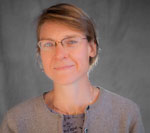Marcia Bjornerud
Walter Schober Professor of Environmental Studies and Professor of Geology
Why an awareness of Earth’s temporal rhythms is critical to our planetary survival
Few of us have any conception of the enormous timescales in our planet’s long history, and this narrow perspective underlies many of the environmental problems we are creating for ourselves. The passage of nine days, which is how long a drop of water typically stays in Earth’s atmosphere, is something we can easily grasp. But spans of hundreds of years—the time a molecule of carbon dioxide resides in the atmosphere—approach the limits of our comprehension. Our everyday lives are shaped by processes that vastly predate us, and our habits will in turn have consequences that will outlast us by generations. Timefulness reveals how knowing the rhythms of Earth’s deep past and conceiving of time as a geologist does can give us the perspective we need for a more sustainable future.
Marcia Bjornerud shows how geologists chart the planet’s past, explaining how we can determine the pace of solid Earth processes such as mountain building and erosion and comparing them with the more unstable rhythms of the oceans and atmosphere. These overlapping rates of change in the Earth system—some fast, some slow—demand a poly-temporal worldview, one that Bjornerud calls “timefulness.” She explains why timefulness is vital in the Anthropocene, this human epoch of accelerating planetary change, and proposes sensible solutions for building a more time-literate society.
This compelling book presents a new way of thinking about our place in time, enabling us to make decisions on multigenerational timescales. The lifespan of Earth may seem unfathomable compared to the brevity of human existence, but this view of time denies our deep roots in Earth’s history—and the magnitude of our effects on the planet.
Marcia Bjornerud is professor of geology and environmental studies at Lawrence University. She is the author of Reading the Rocks: The Autobiography of the Earthand a contributing writer for Elements, the New Yorker’s science and technology blog. She lives in Appleton, Wisconsin.
-
Finalist for the 2019 Los Angeles Times Book Prize in Science & Technology
-
Winner of the 2019 PROSE Award in Popular Science & Popular Mathematics, Association of American Publishers
-
Longlisted for the 2019 PEN/E.O. Wilson Prize for Literary Science Writing Award, PEN American Center
-
One of EcoLit Books' Best Environmental Books of 2018
You can also listen to this interview on a free app on iTunes and Google Play Store entitled 'Raj Persaud in conversation', which includes a lot of free information on the latest research findings in psychology, psychiatry, neuroscience and mental health, plus interviews with top experts from around the world. Download it free from these links. Don't forget to check out the bonus content button on the app.
https://play.google.com/store/apps/details?id=com.rajpersaud.android.rajpersaud
T I M E F U L N E S S : H O W T H I N K I N G
L I K E A G E O L O G I S T C A N H E L P
SAVE THE WORLD
Marcia Bjornerud, Walter Schober Professor of
Environmental Studies and Professor of Geology
Our everyday lives are shaped by processes that
vastly predate us, and our habits will in turn have consequences
that will outlast us by generations. Timefulness reveals how
knowing the rhythms of Earth’s deep past and conceiving of time
as a geologist does can give us the perspective we need for a more
sustainable future. This compelling book presents a new way of
thinking about our place in time, enabling us to make decisions
on multigenerational timescales. The lifespan of Earth may seem
unfathomable compared to the brevity of human existence, but
this view of time denies our deep roots in Earth’s history—and the
magnitude of our effects.

